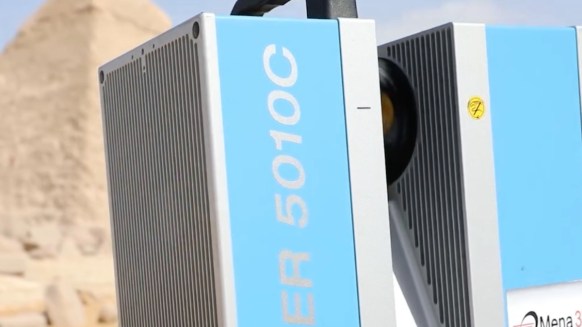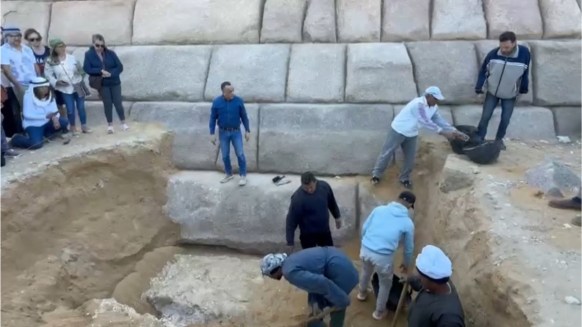Archeologists slam proposed restoration of Egyptian pyramid as a ‘sad disaster’


Granite blocks are already being examined to see how they fit onto the Pyramid of Menkaure. Photo: TND/ Facebook/ Information and Decision Support Center of the Council of Ministers - Egypt
Archeologists have spoken out against plans to restore the surface of an Egyptian pyramid over fears further damage will be done to a priceless historical structure.
In January, secretary-general of Egypt’s Supreme Council of Antiquities Mostafa Waziry posted a video to Facebook showing workers assembling granite blocks at the base the Pyramid of Menkaure, the smallest of the three Pyramids of Giza.
The project, a collaboration between Egyptian authorities and Japanese archeological experts, aims to restore the outer shell of granite about halfway up the four sides of the Pyramid of Menkaure.
Estimated to be more than 4000 years old, half of the pyramid was originally encased in granite blocks, which fell off over time and are reportedly either underground or among the blocks currently scattered above ground around the Pyramids of Giza.
The first step of the project will see the Japanese team conduct a scan to determine which rocks fit into which side of the pyramid.
The scan will take one year to complete. The whole restoration is expected to take about three years.
Waziry dubbed the plan the “project of the century”, but critics are worried it will do more harm than good.
What are the main concerns?
Egyptologist Monica Hanna told Independent Arabia interfering with the nature of the monument could cause major damage, and the Japanese team might not have the archeological expertise required for the process.
Ibrahim Mohamed Badr, associate professor in the department of antiquities restoration and conservation at Misr University for Science and Technology, called the situation a “sad disaster” on X.
He told The New York Times he was worried about which granite blocks on the site — many of which are unpolished — could be confirmed as original to the pyramid.
“The ancient Egyptians would have polished the blocks when installing them in the pyramid itself,” he said.
“Any attempt to fix and polish them would be a blatant interference in the work of the ancient Egyptians, who did not complete this pyramid.”

A laser scan is being conducted to determine the placement of the blocks. Photo: TND/ Facebook/ Information and Decision Support Center of the Council of Ministers – Egypt
There are also concerns over the cost of the project, as Egypt is in the grips of a cost-of-living crisis.
Consumer price inflation in Egypt sat at 32.3 per cent in December; in comparison, Australia’s consumer price index was 4.1 per cent for the same period.
“Please for the love of all the Prophets, leave the pyramids and the ruins alone … start projects to renovate schools and hospitals,” an X user wrote.
What do Egyptian authorities say?
In response to the backlash, Egypt’s Minister of Tourism and Antiquities Ahmed Issa announced last week a scientific committee would review the project.
Headed by archaeologist and former Minister of Tourism and Antiquities Zahi Hawass, committee members will include international experts on antiquities, pyramids and engineering.
Although the committee is set to decide whether the project will go ahead after completing its review, AFP journalists reported that work is already under way, and videos posted to Waziry’s Facebook page show a crane onsite and workers moving blocks of granite.

The base is already being excavated. Photo: TND/ Facebook/ Mostafa Waziry
Before the announcement of the committee, Waziry told al-Mehwar TV the results of the scan would be presented to specialised international scientific committees for the possibility of reinstallation to be studied.
He said Egypt would “not pay a dime” for the initial laser study, and the Japanese team would bear the costs instead.
But when asked by El Kholasa whether Egypt would pay for the project, Waziry reportedly deflected the question.








